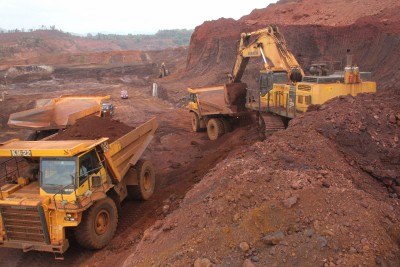
Panaji, Massive mountains of low grade iron ore, many of them several hundred feet high, have now emerged as the latest flash point between the establishment and activists in Goa.
Referred to colloquially as dumps -- on account of the fact that the uneconomical, low grade ore is dumped alongside mining leases -- the mammoth mountains of what was once reject iron ore are now in the crosshairs of the BJP-led coalition government, which is under pressure to make efforts to restart the beleaguered mining industry in Goa ahead of the 2022 Assembly polls.
On Wednesday, Chief Minister Pramod Sawant said that his government had formulated a policy for regularisation of mining dumps on government and private land.
Sawant said that in fiscal 2013-14, the state government had collected nearly Rs 200 crore in fines from mining leaseholders who had dumped reject ore outside the mining lease areas. He added that valid lessees who had paid the fines would be allowed to harvest the ore and export it after taking permission from the Indian Bureau of Mines, on paying royalty. Unclaimed ore, the Chief Minister said, would be auctioned by the government, adding that the dump mining policy was in sync with the Supreme Court directives on the subject.
Sawant added that fresh environment clearances were not mandatory for harvesting the dumps, a point which has enraged green activists in the state.
According to Claude Alvares, director of green NGO Goa Foundation, the Chief Minister's claim is an eyewash.
"The policy for dump mining is an eyewash to hoodwink the people of Goa before the elections and will remain a non-starter since no such permits can be issued until the Supreme Court hears the issues related to dump mining pending before it," Alvares said.
"In the absence of an approval from the Supreme Court and in the absence of any valid leaseholders in Goa, such permits to export dump material are illegal unless the dumps themselves are auctioned instead of being handed out in exchange for royalty," he added, calling the state government policy "completely illegal".
"The new policy is completely illegal since the issue of the disposition of the dumps is still pending before the Supreme Court. The Advocate General of the state had also advised the Goa government against any removal or working on dumps," he said.
Sawant had said that the harvesting of dumps for iron ore alone would restart mining in the state for five years.
"This is why I have been saying there is scope to see the resumption of activity for the next five years. Today we have finalised the ore rates for auction depending on various grades," Sawant said.
Interestingly, while Sawant has claimed that there is around 10 to 20 million metric tonnes of iron ore in Goa's mining dumps, the state government's Goa Mineral Policy 2013, states that according to undertakings submitted to the authorities at the time, the total ore stock in the dumps was in excess of 700 million tonnes.
The opposition has however raised red flags over Sawant's new initiative, which former Deputy Chief Minister and Maharashtrawadi Gomantak Party leader Sudin Dhavalikar has said is more oriented towards elections rather than restarting the mining industry in Goa, where fresh iron ore extraction has been banned since 2018.
"Chief Minister took a cabinet decision to allow extraction of 10 to 20 million tons of ore from dumps. I challenge the government that these are not 10 to 20 million tons, it is more than 100 million tons. These dumps could be a source of a new scam," Dhavalikar said.


.jpeg)

